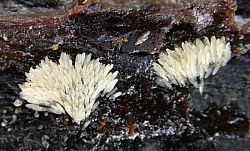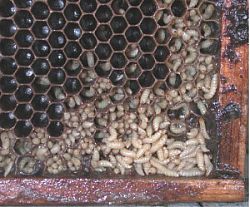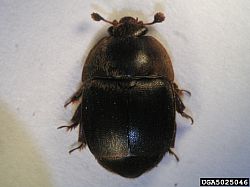 Eggs laid by the small hive beetle (photo uni-graz.at)
Eggs laid by the small hive beetle (photo uni-graz.at)
 Infestation of small hive beetle larvae
Infestation of small hive beetle larvae
 Adult small hive beetle
Adult small hive beetle
The small hive beetle Aethina tumida (SHB), native to sub-Saharan Africa, was found in Europe for the first time in south west Italy on 5th September 2014. LASI Researcher Norman Carreck has just returned from a Workshop and Extension Day (February 19-20th) entitled “A European strategy for small hive
beetles Aethina tumida”, held in Bologna, Italy. This was organized by the COLOSS honey bee research association, and CRA-API, Bologna. The first day was attended by 52 bee scientists from 17 countries. These included many who had research or practical experience of small hive beetles in Africa, Australia or the USA, and those keen to find out more about the beetle in order to formulate contingency plans. The second day was attended by more than 100 people, mainly from Italy, including government officials, veterinarians, advisors, representatives of beekeeping organizations, and ordinary beekeepers.
The Workshop agenda focused on current knowledge about the SHB and how this may be utilized following its discovery in Italy. In the first part of the workshop, those who had been involved with the beetle shared their experiences. In the second part of the day, there was extensive discussion of gaps in our knowledge and pressing research needs. This second day’s proceedings were in Italian, with simultaneous translation into English. The morning session
featured talks from the previous day’s speakers, together with comments from representatives of the Italian Ministry of Health and Ministry of Agriculture, Food and Forestry. The afternoon was again open for discussion. Representatives of beekeeping groups expressed concern about the policy of destruction, which has led to the burning of some 3,500 hives. Although government compensation has been promised, this has yet to be received, and will cover only loss of colonies and equipment, not loss of income. The Calabria region has many commercial queen rearers and producers of package bees, whose businesses will be severely affected by the restrictions.
At the time of writing, it is not known whether the beetle has been successfully eliminated. Positive signs are that with the exception of one case in Sicily, known to be directly related to the outbreak in Calabria, no cases have been found outside the 20 km radius Protection Zone. Negative signs, are however, the discovery of beetle larvae, and discovery of infestation in a wild honey bee colony, both of which suggest that the beetle was present for some time before discovery. In 2014 some 20,000 packages of bees were exported from Italy to various other European Country, raising the possibility that it has been unwittingly transported elsewhere. The situation will become much clearer with inspection of hives this spring.
There was much discussion about if and when it should be concluded that the beetle has become “established”, and what measures to prevent further spread whilst modifying management practices to live with the beetle should then be adopted. The biological requirements of the beetle, especially soil conditions of moderate humidity and warm temperature for its pupation, mean that certain regions of the world, including much of the Mediterranean but also parts of south. America and South East Asia will prove suitable for the mass reproduction of the beetle, whilst it is unlikely to
prove a serious problem elsewhere.
Despite the adverse effects on the livelihoods of beekeepers, especially professional beekeepers, Norman felt that the meeting was very positive.All agreed that cooperation with the beekeeping community is absolutely essential if an effective strategy is to be developed.
For more info can be found on the COLOSS (Prevention of honey bee COlony LOSSes) website.
Picture above: Delegates at the COLOSS small hive beetle Workshop, Bologna (Photo: Noa Simon Delso).


